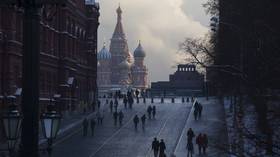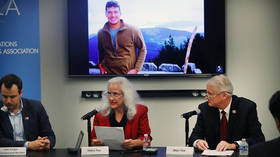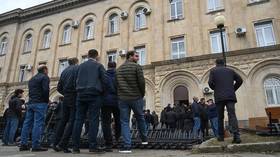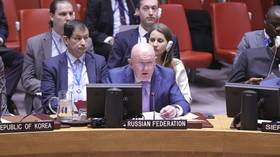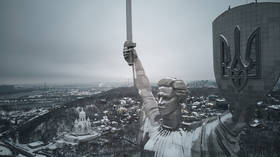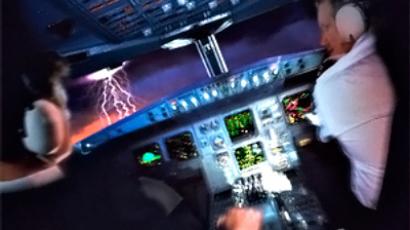Severe quake destroys Haitian capital
A major earthquake shook Port-au-Prince, the capital of impoverished Haiti, on Tuesday. According to the Red Cross, more than three million people have been affected and over 600,000 reportedly injured.
The organization estimated that some 45,000 to 50,000 people were killed in the quake. Many dead bodies are still laying in the streets, raising concerns over the sanitary situation in the city.
People left homeless are gathering in improvised camps and being sheltered from the sun under tents made from bed sheets. Many are trying to save their relatives and friends from the rubble with their bare hands.
The first of three plane loads of Russian aid cargo has departed from the Dominican Republic towards neighboring Haiti. Two others are to follow within hours.International rescuers face major challenges to deliver aid across the border to quake-stricken Haiti. Due to the massive damage caused by the earthquake, Haiti's airport is only able to receive a few aircraft per day. Further, aid deliveries from many countries remains stranded in Santo Domingo while the humanitarian disaster in Haiti escalates.
The US Geological Survey says the earthquake was centered about 15 kilometers west of Port-au-Prince. This is the last major quake since a magnitude-6.7 temblor in 1984.
The island state, considered the poorest country in the Western hemisphere, is said to be suffering “a catastrophe of major proportions.”
A plea has already been made for international aid for victims of the quake in Haiti.
The UN has pledged to allocate $US 10 million to help the victims of the disaster. The European Commission has approved 3 million Euros for humanitarian aid. Further, the World Bank will allocate $US 100 million to the country, if the proposal is approved by the board of directors.
Many countries are ready to dispatch planes with supplies and rapid response teams to the region.
Dmitry Medvedev has ordered a Russian mobile hospital to be sent to the island. A Russian Il-76 plane with a hospital and 20 doctors onboard is set to leave for Haiti on Thursday. The hospital is capable of accommodating up to 50 patients and has state-of-the-art diagnostic, therapeutic and surgery facilities.
According to first deputy Russian envoy to the UN Igor Scherbak, Russia will also send a transport plane with two helicopters onboard to be used in search operations.
Overall, Russia has already dispatched three planes with medical equipment, provisions and crews of professional medics and rescuers from the EMERCOM (Russian Emergency Ministry) to Haiti to help local authorities deal with earthquake damage.
President Barack Obama issued a statement saying his thoughts and prayers are with the people of Haiti and that the United States stands ready to help the island nation.
Secretary of State Hillary Clinton said from Honolulu that the US was gathering information about the quake and its impact, and the government was offering full civilian and military assistance to Haiti.
Journalist Paola Soto from the Dominican Republic said his country is doing much to help their neighbor.
“In the Dominican republic, at this moment, assistance stations for victims have been set up, there are many volunteers. All around the country centers to gather donations for the victims of the catastrophe are being created. The Seismology Institute in the Dominican Republic monitors the situation and monitors the after-shocks,” Soto said.
Apart from the destroyed infrastructure, recovery efforts in Haiti could be complicated by more aftershocks, which are likely to follow, according to Evgeny Rogozhin from the Russian Academy of Sciences.“We can expect strong and regular aftershocks in the region for about a month,” Rogozhin said. “Unfortunately, the earthquake hit a densely populated area, the capital of Haiti. It's no secret that the quality of buildings there is very poor. These houses were not designed to withstand any kind of seismic impact. The region's poverty also made it very hard to predict the quake – there's simply no measuring equipment there.”
RT spoke to Russian policeman Roman Bryusov who is in the international contingent in Haiti. He said the earthquake not only hit the country’s infrastructure, but has also set back all global efforts to bring stability to Haiti.
“If it is not political instability, it is a natural disaster. There have been no such earthquakes for the last two hundred years and this catastrophe one again pushes Haiti back. The earthquake hit not only the infrastructure but the achievements of the UN mission. Some one hundred of the UN staff are feared dead now, but looking to the pictured of the destroyed UN headquarters in Haiti you know less of a chance remains to find them,” Bryusov said
Meanwhile, an RT journalist who used to work in Haiti says it's one of the most corrupt countries in the world, and other countries should be very careful who they send their help to.Marcelo Sanchez, a correspondent from RT's Spanish-language sister channel, who is in the Dominican Republic says that it will take a day or two to get a clear picture of the damage.
“There are no signs of organized operations regarding those trapped in the debris,” Sanchez asserted. “And doctors in Haiti, the poorest country in the western hemisphere, are ill equipped to treat the injured at this point.”
Later Marcelo Sanchez reported that help had begun to arrive. “We have a cable from the local station saying that China and Russia have sent planes with rescue workers and trained dogs to search for survivors,” Sanchez claimed.
Anastasia Churkina from RT’s New York office says the problem right now is not a lack of help but current ground conditions, which are hampering aid efforts.
“Basic supplies such as water and food are not there on the ground and heavy lifting devices and sniffer dogs are needed,” Churkina said. “Right now it’s taking up to six hours to unload one airplane and there is only one lane at the airport. This is making rescue operations very difficult.”
Lawrence Wilkerson, a George Washington University professor and a former chief of staff to Colin Powell, claims that major disorganization is hindering the rescue process in Haiti.
“You’ve got major problems here with even getting relief in,” Wilkerson told RT. “There is something we call MOG in military terms – Maximum On Ground Capacity – of the air fields. You can’t get relief in fast except by aircraft, and getting it in by aircraft depends on the number of aircraft you can have on the ground at any given time. You can’t have very many aircraft in Haiti, so it’s a tremendous logistical effort just to try to flow goods, materials, medical help and so forth into the country.”




